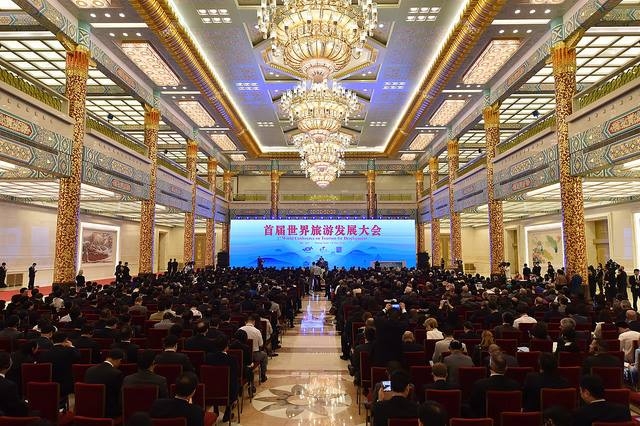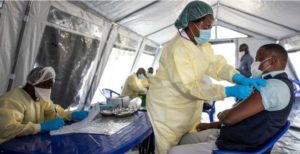World Tourism Conference concludes issuing “ Beijing Declaration “

By Ramesh Tiwari —
Beijing: The First World Conference on Tourism for Development concluded focusing to integrate sustainable tourism in relevant policies, initiatives, projects and research in order to foster the role of tourism as a tool for sustainable development and poverty reduction.
During the four-day event, organized by UNWTO and the Government of the People’s Republic of China, 1000 participants from over 100 countries held in-depth discussions on different issues of travel and tourism industry.
The conference issued “Beijing Declaration “ stressing necessary changes in policies, business practices and behaviour to increase the contribution of tourism to sustainable and inclusive development and peace.
The role of tourism in fighting poverty and building peace were the key focus of the First World Conference on Tourism for Development.
The conference included three main panel sessions dedicated to the contribution of tourism to the Sustainable Development Goals (SDGs), to poverty alleviation and to peace.
Participants in the session on tourism and poverty underlined that there is a lack of understanding and research on the impact of the sector on poverty levels. They called for better monitoring, measuring and communication through both solid indicators and people-centered stories.
The conference, dedicated to tourism and peace, stressed how people-to-people diplomacy is inherent to tourism while calling for investment in education and youth to build more stable societies.
Opening the conference, Premier Li Keqiang underlined the role of tourism in lifting people out of poverty and the importance of stepping up international cooperation in tourism.
Premier Li Keqiang emphasized tourism’s capacity to stimulate economic growth, create jobs and foster inclusive development. “As we look for new drivers of growth, tourism has a very important role to play not only for its direct impact but also for the value it adds to other sectors,” he said. China announced the launch of an international tourism cooperation plan.
Addressing the conference the President of Mozambique, Filipe Jacinto Nyussi, emphasized that inclusion through tourism requires investment in education and capacity building.
The links between development and peace were stressed by UNWTO Secretary-General, Taleb Rifai, who said: “There can be no development without peace and no peace without development”.
In a message delivered to the conference by the UN Under-Secretary-General for Economic and Social Affairs, Mr Wu Hongbo, United Nations Secretary-General Ban Ki-moon said: “When tourism is well-managed, it has tremendous capacity to create decent jobs, provide opportunities for inclusion and education, and contribute to preserving cultural heritage and the environment.”
The participants included: the Vice-Presidents of the Islamic Republic of Iran, Mauritius and Vanuatu, the United Nations Under-Secretary-General for Economic and Social Affairs Wu Hongbo, representing the UN Secretary-General, ministers and high-level tourism officials from Argentina, Bahrain, Bulgaria, Cambodia, Czech Republic, Ethiopia, Germany, Georgia, Indonesia, Iran, Jordan, Kenya, Lithuania, Malta, Malaysia, Mauritius, Mexico, Republic of Korea, Saudi Arabia, Slovenia, Sri Lanka, South Africa, UK, USA, Vanuatu and Zimbabwe, and SDG Advocate Ambassador Dho Young-Shim, as well as representatives of the World Bank, the Japan International Cooperation Agency (JAICA), the World Tourism Cities Federation, the Petra National Trust Fund, the Beijing Municipality, Guangxi Zhuang Autonomous Region, and Guizhou Province.
Text of Beijing Declaration on Sustainable Tourism as a driver of Development and Peace
We, the representatives of the tourism administrations, international and regional organizations, the private sector, academia and civil society, gathered at the First World Conference on Tourism for Development, organized by the Government of the People’s Republic of China and the WorldTourism Organization (UNWTO) in Beijing, China, on 18–21 May 2016,
Recalling
1. UNWTO’s mandate as stated in Article 3 of its Statutes (1970): “The fundamental aim of the Organization shall be the promotion and development of tourism with a view to contributing to economic development, international understanding, peace and prosperity, and universal respect for, and observance of, human rights and fundamental freedoms for all without distinction as to race, sex, language or religion”;
2. The United Nations (UN) General Assembly resolution A/RES/53/243 of 6 October 1999, entitled Declaration on a Culture of Peace, which recognizes that “ peace not only is the absence of conflict, but also requires a positive, dynamic participatory process where dialogue is encouraged and conflicts are solved in a spirit of mutual understanding and cooperation”;
3. The UN General Assembly resolution A/RES/66/288 of 27 July 2012 that endorses the outcome document of the UN Conference on Sustainable Development, the Future We Want, which emphasizes that “well-designed and managed tourism can make a significant contribution to the three dimensions of sustainable development, has close linkages to other sectors, and can create decent jobs and generate trade opportunities”;
4. The UN General Assembly resolution A/RES/69/233 of 19 December 2014 on the Promotion of sustainable tourism, including ecotourism, for poverty eradication and environment protection, which recognizes that “sustainable tourism, including ecotourism, represents an important driver of sustainable economic growth and decent job creation, that it can have a positive impact on income generation and education, and thus on the fight against poverty and hunger, and that it can contribute directly to achieving the internationally agreed development goals”;
5. The UN General Assembly resolution A/RES/69/313 of 27 July 2015 that endorses the outcome document of the Third International Conference on Financing for Development, Addis Ababa Action Agenda, which underlines the need to “[…] develop and implement innovative tools to mainstream sustainable development, as well as to monitor sustainable development impacts for different economic activities, including for sustainable tourism”;
6. The UN General Assembly resolution A/RES/70/1 of 25 September 2015 on Transforming our world: the 2030 Agenda for Sustainable Development, which adopts a comprehensive peoplecentered set of universal and transformative Sustainable Development Goals (SDGs), as well as considerations related to the means of implementation and follow-up and review, and commits to achieving sustainable development in its three dimensions — economic, social and environmental — in a balanced and integrated manner;
7. The UN General Assembly resolution A/RES/70/193of 22 December 2015, which adopts 2017 as the International Year of Sustainable Tourism for Development and encourages the UN system and all other actors to support sustainable tourism at all levels, including international cooperation, “as a means of promoting and accelerating sustainable development, especially poverty eradication”;
8. The Istanbul Programme of Action for the Least Developed Countries (LDCs), the Small Island Developing States Accelerated Modalities of Action (Samoa Pathway), and the Vienna Programme of Action for Landlocked Developing Countries (LLDCs), which recognize the importance of sustainable tourism for, inter alia, economic growth, job creation and foreign exchange earnings;
9. The UNWTO Global Code of Ethics for Tourism, approved by the UNWTO General Assembly in 1999 and endorsed by the UN General Assembly in 2001;
10. The 10-Year Framework of Programmes on Sustainable Consumption and Production Patterns (10YFP), notably the 10YFP Sustainable Tourism Programme that encourage the shift towards green growth and sustainable development.
Considering that
11. Tourism is one of the fastest growing socio-economic sectors, accounting currently for an estimated 10% of world GDP, 1 in 11 jobs and 7% of global trade;
12. Tourism is an important instrument for sustainable development as it can stimulate economic growth, create jobs, attract investment, enhance the quality of life of host communities, foster entrepreneurship, preserve ecosystems and biodiversity, protect cultural heritage and promote the inclusiveness, empowerment and ownership of local communities;
13. Tourism represents a major share of trade in services, has multiple links to other economic sectors and can generate development opportunities along the entire tourism value chain;
14. Tourism is featured in three of the 17 SDGs, namely Goal 8, 12 and 14 on inclusive and sustainable economic growth, sustainable consumption and production, and the sustainable use of oceans and marine resources, respectively, and yet has the potential to contribute to sustainable development in general in view of its cross-cutting nature;
15. Tourism is well-positioned to fight poverty through creating employment and entrepreneurship opportunities, benefitting particularly youth, women, indigenous and disadvantaged communities;
16. Tourism can make a particularly significant contribution to all developing countries, Least Developed Countries (LDCs), Landlocked Developing Countries (LLDCs), and Small Island Developing States (SIDS) in accelerating the decoupling of growth from resource use, and eradicating poverty in all its forms and dimensions, including extreme poverty;
17. Tourism can contribute to the promotion of economic, trade and cultural links between developed and developing countries and regions by enhancing cooperation at all levels, nurturing mutual respect, tolerance and understanding among nations and civilizations; 18. Tourism is based on human interaction between visitors and host communities, creating a link that can — under appropriate circumstances — promote intercultural and inter-national understanding, reduce stereotypes, encourage mutual respect among people and thus contribute to a culture of peace;
19. Tourism relies on a peaceful and stable environment, whereas peace-sensitive tourism could create and support, as appropriate, efforts to build and consolidate peace;
20. As a sector that is quickly outpacing other economic sectors, tourism can play an important role in mitigating the impact of global warming due to climate change through the promotion of responsible tourism practices and principles;
21. Tourism can spread development and wealth to least developed regions of developing countries and help eradicating poverty through creating employment and entrepreneurship opportunities;
22. Tourism is a pioneering force in the globalization process as it shapes our personal identities, collective worldviews, and the future of international integration.
Call upon
23. Governments, to acknowledge that countries are in different stages of development, to respect and encourage countries and regions to explore models of tourism development suited to their own conditions, to take part in international and regional tourism cooperation in the spirit of openness, innovation and mutual benefit, and to jointly promote inclusive and sustainable development of the tourism sector;
24. Governments, to develop an integrated approach to tourism policy that caters for the crosscutting nature of the sector and leverages its multiplying effect on the economy, to implement national tourism policies that facilitate the coordinated use of economic, natural and sociocultural resources, promote integration and equity, and to encourage a holistic tourism destinations’ development;
25. Governments, to integrate and prioritize sustainable consumption and production in national planning and policy making, including tourism, to accelerate the shift towards more sustainable consumption and production patterns;
26. Governments, to ensure that tourism development is based on responsible and sustainable planning, evidence-based decision making, and the involvement of all stakeholders, including the private sector and host communities;
27. Governments, to integrate poverty reduction targets into tourism policies and strategies — in line with national poverty reduction strategies — to ensure that poor and marginalized communities become key stakeholders in tourism development processes and share the same opportunities and benefits of tourism development;
28. Governments, to advance and support regional tourism cooperation through strengthened connectivity and improved tourism facilitation in the region through initiatives such as the Belt and Road Initiative, eestablishment of the Sustainable Tourism Zone of the Greater Caribbean (STZC) and the Inter-American Congress of Ministers and High Authorities of Tourism, among others;
29. Governments to encourage the development of domestic tourism through policies and programs involving all stakeholders on both the demand and supply sides in addition to international tourism and which can facilitate widespread access to leisure, travel and holidays for all;
30. Governments, the private sector and all other relevant stakeholders, to promote innovation in tourism products, business models, and management, openly share relevant experiences and push forward the transformation and upgrading of the tourism sector in order to improve its quality and vitality;
31. Governments, the private sector and all other relevant stakeholders, to support green tourism development and foster investment in infrastructure and technology that helps to improve resource efficiency and decouple economic growth from resource use and environmental degradation;
32. The private sector, act in line with the principles of the Global Code of Ethics for Tourism and advance Corporate Social Responsibility (CSR) initiatives;
33. Governments, the United Nations and international organizations, to support enhanced North- South, South-South and triangular cooperation in tourism with shared benefits, and strengthen the tourism development capacity of developing and least developed countries; 34. Governments, to promote safe and seamless travel through coordinated cooperation among inbound and outbound states, the fostering of public-private partnerships, the use of technology and the sharing of data;
35. The global donor community to recognise the potential of tourism to contribute to sustainable and inclusive growth in developing countries as reflected in the 2030 Agenda for Sustainable Development (inter alia targets 8.9, 12.b and 14.7 of the SDGs);
36. Governments, the United Nations, international organizations, finance institutions, as well as philanthropic foundations and the private sector, to increase financial support for tourism infrastructures, tourism planning and training;
37. Governments, to include tourism in national and international emergency preparedness measures in order to build resilience of the tourism sector, reduce the risk of damage and loss, accelerate recovery and provide collective support to countries and nations affected by hardship and vulnerability;
38. All stakeholders, to acknowledge and promote tourism as an effective tool for nurturing respect, tolerance and mutual understanding between people, nations and cultures, and contributing to building a culture of peace and dialogue between civilizations;
39. Academia, to advance research on the intrinsic relationship between tourism and peace – including, but not limited to, the sector’s contribution to poverty reduction – as well as to define peace-sensitive tourism and elaborate guidelines and recommendations that can support the building of an international culture of peace and equality;
40. Governments, with the support and participation of all relevant stakeholders, to engage in pertinent sub-national, national, regional, international and multilateral processes in order to advance and implement the above-mentioned objectives;
41. Governments, the United Nations, international organizations, the private sector and the academia, to support programs, strategies and experiences aiming at taking advantage of the benefits of tourism for the consolidation of peace scenarios in territories with a background of violence and conflict;
42. Governments, regional authorities, the private sector and all other relevant stakeholders to maximise the efforts in improving the accessibility of the whole tourism value chain at tourism destinations.
Pledge to
43. Advance the contribution of tourism to the achievement of the 2030 Agenda for Sustainable Development and the SDGs in its respective areas of action, duly recognizing tourism as an important tool for development and peace;
44. Ensure the necessary changes in policies, business practices and behaviour to increase the contribution of tourism to sustainable and inclusive development and peace;
45. Further integrate sustainable tourism in relevant policies, initiatives, projects and research in order to foster the role of tourism as a tool for sustainable development and poverty reduction. Extend our sincere gratitude to our host, the Government of the People’s Republic of China, for its warm hospitality and amiable support for the organization of the First World Conference on Tourism for Development, as well as its significant contribution to the advancement of the sustainable tourism agenda as a driver of peace and development.
Beijing, 19 May 2016
(Inputs – UNWTO )















